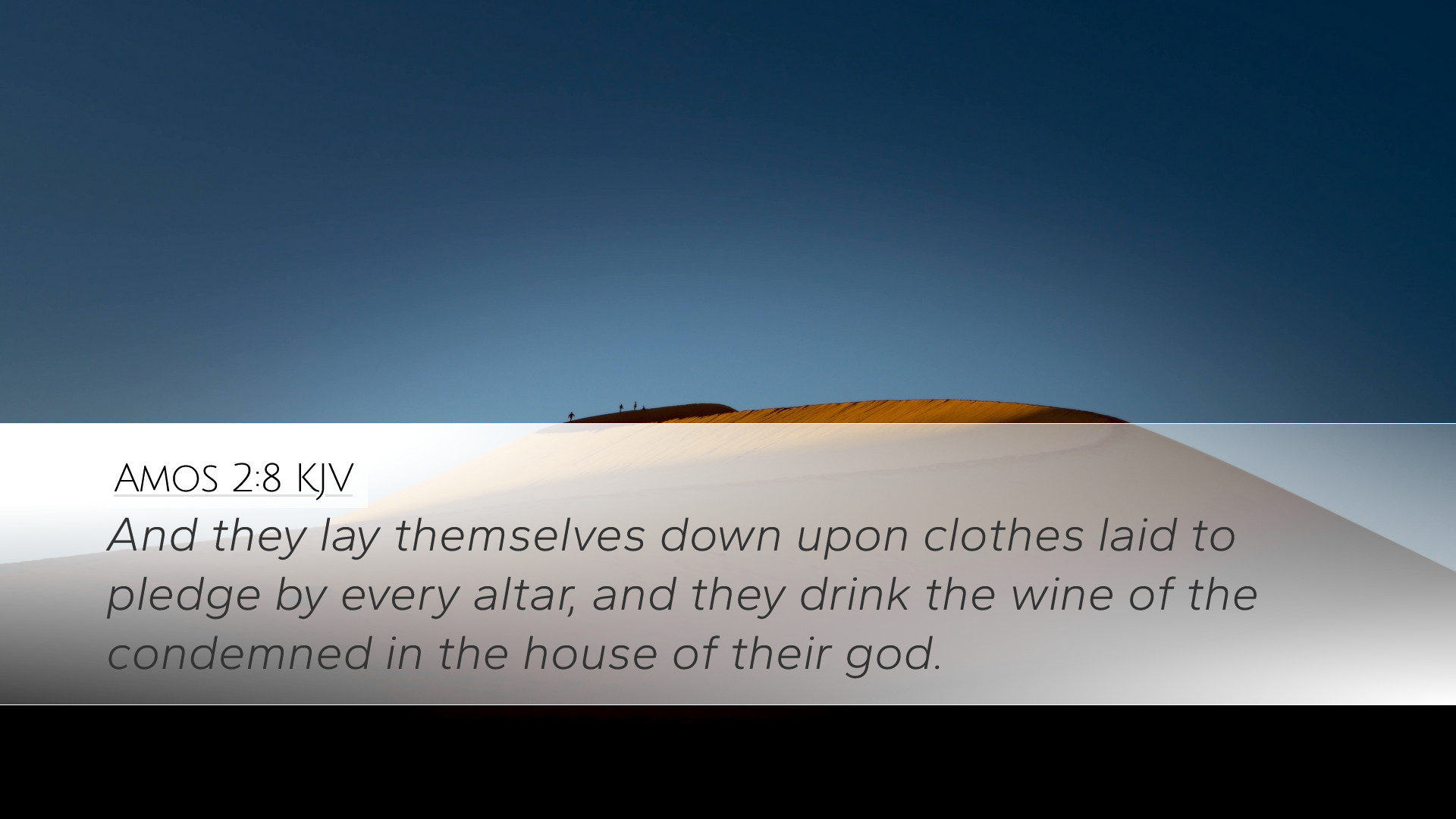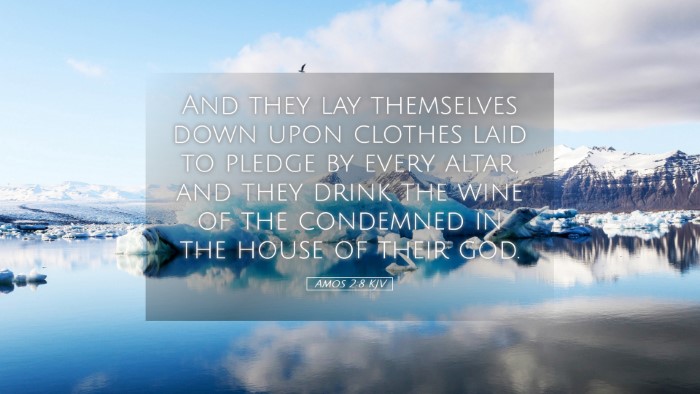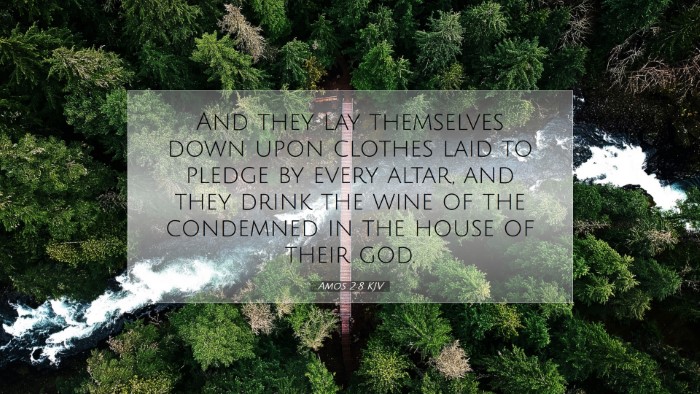Old Testament
Genesis Exodus Leviticus Numbers Deuteronomy Joshua Judges Ruth 1 Samuel 2 Samuel 1 Kings 2 Kings 1 Chronicles 2 Chronicles Ezra Nehemiah Esther Job Psalms Proverbs Ecclesiastes Song of Solomon Isaiah Jeremiah Lamentations Ezekiel Daniel Hosea Joel Amos Obadiah Jonah Micah Nahum Habakkuk Zephaniah Haggai Zechariah MalachiAmos 2:8
Amos 2:8 KJV
And they lay themselves down upon clothes laid to pledge by every altar, and they drink the wine of the condemned in the house of their god.
Amos 2:8 Bible Commentary
Commentary on Amos 2:8
The verse Amos 2:8 states: "And they lie down upon clothes laid to pledge by every altar, and they drink the wine of the condemned in the house of their god." This verse provides significant insights into the social, moral, and spiritual conditions of Israel during Amos' prophetic mission. Below is a synthesis of insights derived from notable public domain commentaries.
Contextual Overview
The prophetic book of Amos emerges from a period of prosperity in Israel, yet beneath the surface, there lies a deep moral decay. The Israelites are criticized for their injustices and their disregard for the covenantal obligations that outline their relationship with God.
Amos’ Prophetic Ministry
Amos was a shepherd called by God to prophesy against Israel, revealing the serious implications of their social injustices. The context surrounding Amos 2:8 must be understood against this backdrop, highlighting the stark contrast between God’s holiness and the people’s unrighteousness.
Analysis of Amos 2:8
This verse provides a vivid depiction of the corrupt practices among the Israelites. It is essential to dissect the elements within the verse to unpack its full meaning and implications.
Clothes Laid to Pledge
The phrase “they lie down upon clothes laid to pledge” indicates a grave injustice. In ancient Israel, it was customary to use a cloak as a pledge or collateral for a debt. However, lying down on these items at the altar signifies complete disregard for the rights of the poor and the needy.
- Matthew Henry: Henry emphasizes the exploitation of the poor, as wealthy individuals would take essential items from the impoverished as collateral, leaving them without protection from the elements.
- Albert Barnes: Barnes remarks that such acts within the temple setting highlight the hypocrisy of worshippers who engage in unrighteous acts while purporting to honor God.
- Adam Clarke: Clarke posits that the idea of lying down on pledged clothes points to the harsh oppression faced by the lower classes, ignored by those in power.
Drinking the Wine of the Condemned
The second part of the verse mentions “they drink the wine of the condemned”. This phrase suggests indulgence in substances that have been obtained through unjust means or through the exploitation of others.
- Matthew Henry: He connects this to how the worshippers partake of offerings that are not genuinely offered to God but are tainted with the guilt of wrongdoing.
- Albert Barnes: Thus, he notes that such consumption reflects a heart hardened against both moral and spiritual convictions.
- Adam Clarke: Clarke provides insight into the nature of the wine itself, describing it as representative of embracing pleasures derived from oppression, which distracts the people from their covenant obligations with God.
The House of Their God
The mention of “the house of their god” serves as a powerful reminder of the place designated for worship that has become a site of corruption rather than holiness.
- Matthew Henry: He asserts that their worship is an abomination, as they present themselves before God while engaging in these sins.
- Albert Barnes: Barnes indicates the irony of worshippers receiving blessings in a space where their actions oppose the very principles of justice and mercy that God desires.
- Adam Clarke: Clarke comments on the sacredness associated with the temple, underscoring the disgrace of treating such a holy place with such irreverence by coupled acts of iniquity.
Theological Implications
The theological significance of Amos 2:8 extends beyond its historical context, providing lessons that resonate throughout time.
Holiness and Justice
The verse underscores the relationship between holiness and justice. God’s call for righteousness is evident in the necessity of aligning worship with ethical conduct.
Warning Against Hypocrisy
This passage serves as a stern warning against hypocrisy. The actions of the Israelites illustrate the dangers of compartmentalizing faith and morality, which is a common pitfall faced by individuals and communities today.
Social Responsibility
As believers, there exists a profound call to uphold social justice and care for the vulnerable. Amos 2:8 serves to remind leaders and laity alike of their responsibility to advocate for the oppressed.
Practical Applications
Reflecting on the harsh realities depicted in Amos 2:8, pastors, theologians, and scholars can draw critical applications for contemporary faith communities.
- Encouragement of Just Practices: Churches should actively promote ethical treatment of all individuals and create environments where economic inequities are addressed.
- Integrating Faith with Action: A call to integrate worship with social action, ensuring that faith manifests itself in tangible service to the community.
- Fostering Accountability: Encouragement of accountability among leaders for maintaining integrity both in worship and in their dealings with congregants and society at large.
- Education on Social Issues: Providing education and awareness on social justice issues within church communities to develop compassion and action among members.
Conclusion
In conclusion, Amos 2:8 paints a dismal picture of religious practice compounded by social injustice. Through the insights of public domain commentaries, a more profound understanding emerges, allowing leaders and scholars to explore the text's rich depths while addressing pressing moral issues in today’s context. This verse not only serves as a historical admonition but also calls for profound reflection and transformation within individual hearts and church communities.


